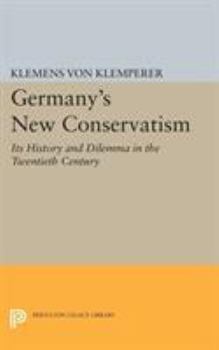Germany's New Conservatism: Its History and Dilemma in the Twentieth Century
Select Format
Select Condition 
Book Overview
This is at once a chapter in the history of ideas and, by reason of its focus on the Weimar Republic, a case study. The author first offers a stimulating approach to a definition of that much abused word, conservatism. He then discusses the new conservatism's roots in such men as Burckhardt and Nietzsche, the various elements of the movement itself, and three major expressions of it--Moeller van den Bruck, Spengler, and Ernst Junger. Finally, he...
Format:Paperback
Language:English
ISBN:0691622647
ISBN13:9780691622644
Release Date:December 2015
Publisher:Princeton University Press
Length:284 Pages
Weight:0.62 lbs.
Dimensions:0.6" x 5.0" x 8.0"
Customer Reviews
0 rating





